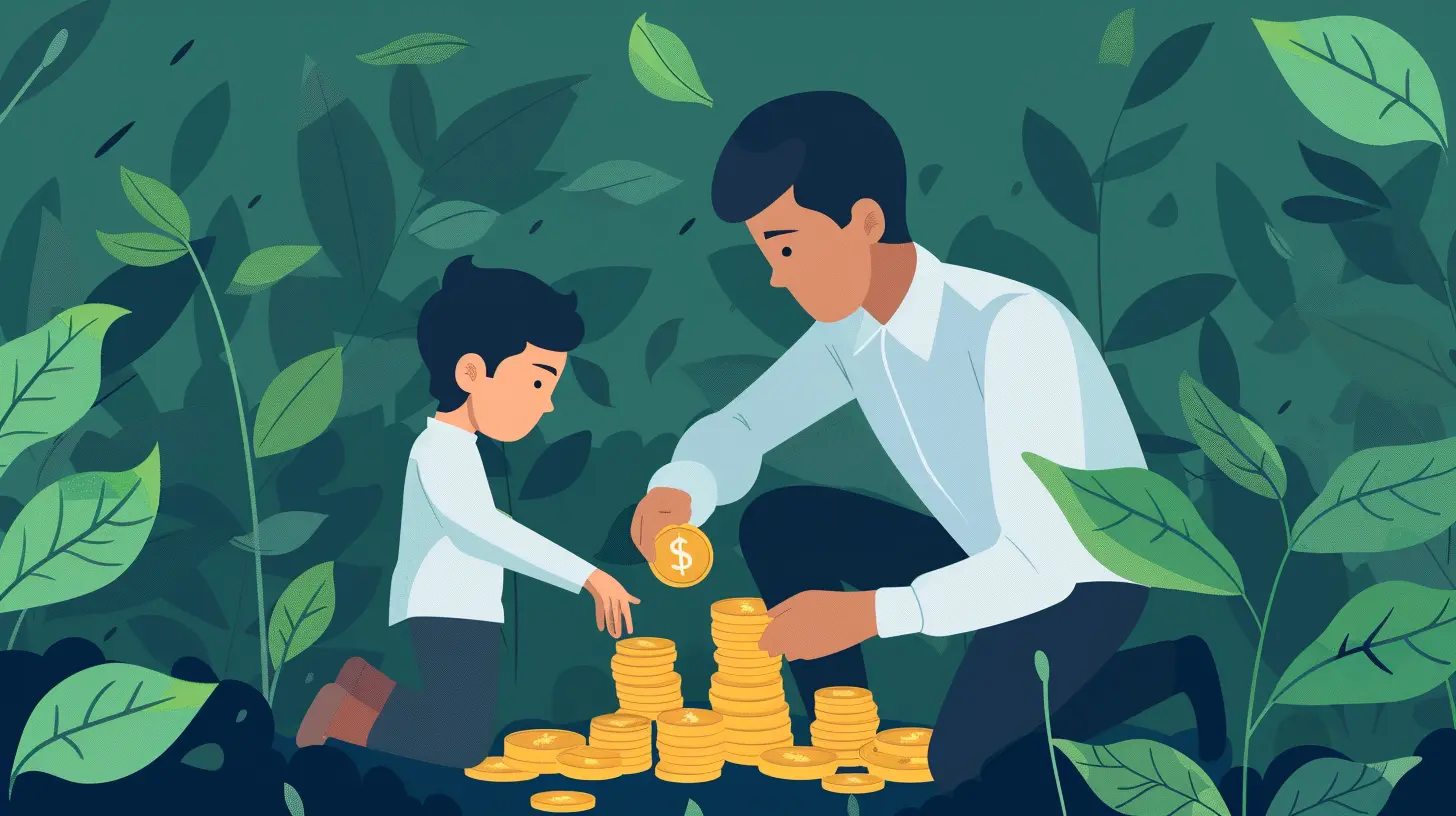Helping Your Teen Develop Good Financial Habits
7 October 2025
Let’s be real—managing money isn’t something that magically clicks when your teen turns 18. Most adults are still trying to figure it out themselves! So, how do we expect our teens to understand budgeting, saving, or credit card interest if we don’t teach them? That’s why helping your teen develop good financial habits should be one of your top parenting priorities.
In this post, we’re going to break this big topic into bite-sized, totally doable pieces. Think of it like building a financial toolkit your teen can carry into adulthood. It’s all about building confidence, responsibility, and smart money decisions—together.
Why Teaching Teens About Money Matters
Money isn’t just about dollars and cents—it’s about choices, values, and future independence. Teens who learn how to manage money early on are more likely to avoid debt traps, save consistently, and make savvy financial decisions down the road.But here’s the catch: schools don’t always cover personal finance in-depth. That means it often falls on us, the parents, to fill in the gaps. And guess what? You don’t need to be a financial expert to do this. You just need to be willing to coach, guide, and talk real with your teen.
Start Early—Even If It’s Just With Chores and Allowance
Got a middle schooler? It’s never too early. Got a high school junior? No worries—you’re right on time.The earlier you start teaching financial responsibility, the better. If your teen is already earning money from chores, babysitting, or a part-time job, they're already dealing with real-world cash. That’s the perfect teaching opportunity.
How to Begin
- Give them real money to manage: Whether it’s an allowance or earned income, let them handle it. Resist the urge to micromanage.- Use a “save, spend, give” system: Set up three jars (or envelopes or digital accounts) to separate money into these categories.
- Encourage independence: Let them decide how to spend their “spend” money—even if it’s not what you’d choose. Natural consequences are great teachers.

Talk About Budgeting Without Making It Boring
Let’s face it—“budgeting” sounds about as exciting as folding laundry. But budgeting is just a fancy word for “having a plan for your money.” And teens love plans that give them more freedom.Make It Relatable
Instead of running through spreadsheets, use examples they care about:- “How much do you spend on Starbucks in a week?”
- “Let’s figure out how much you need to save to buy those new sneakers.”
- “Want a car? Let's map out a monthly budget together.”
There are also some awesome budgeting apps made just for teens (like BusyKid, Greenlight, or GoHenry) that gamify the process and make it more engaging.
Teach the Power of Saving
This one is huge. Teens live in the here and now, which makes saving for future “someday goals” kind of boring. But saving isn’t about deprivation—it’s about buying freedom later.How to Make Saving Stick
- Set short-term goals: Saving for prom, a concert, or an upgraded phone can motivate them more than a vague “emergency fund.”- Match their savings: A little “parent match” deal (like a 401k) can be a fun way to encourage them to save more.
- Celebrate milestones: Whether it's their first $100 saved or paying for something entirely on their own—make a big deal out of it.
The Smart Way to Introduce Credit and Debt
Credit cards, loans, and interest rates are confusing even for adults. But if your teen doesn’t understand how these things work before college, they could end up piling on debt out of ignorance.What to Teach Them
- Credit isn’t free money: Make sure they understand what interest is and how it compounds over time.- Minimum payments are a trap: Show them real-life examples of how it can take years to pay off a small balance with minimum payments.
- Build credit slowly: If your teen is mature and responsible, consider making them an authorized user on your credit card to start building a positive credit history.
Let Them Make Mistakes (Seriously)
We know it’s hard, but letting your teen mess up a little with money now can save them from major mistakes later.Maybe they blow their allowance on fast food and can’t go to the movies later. That’s OK! It’s better to learn that lesson at 15 than at 25 with rent due.
Your job? Be there to guide—not rescue—them. Talk about what happened, help them reflect, and brainstorm how they'll do it differently next time.
Encourage Earning, Not Just Spending
Giving your teen money now and then is fine—but teaching them how to earn it? Game changer. Work builds confidence, introduces real-world money value, and teaches time management.Teen-Friendly Job Ideas
- Babysitting or pet sitting- Tutoring
- Yard work or snow shoveling for neighbors
- Part-time retail or food service jobs
- Selling handmade crafts or clothes online
Even if they only work a few hours a week, they’ll start seeing money as something earned—not just given.
Open a Teen Bank Account
This one feels official—and teens love anything that makes them feel more adult. Opening a joint bank account or even a prepaid debit card gives them real responsibility while you keep a watchful eye.What to Look For
- A fee-free account with parental controls- Mobile app access so they can monitor their balance
- Direct deposit option if they have a job
Let them manage their own money but review monthly statements together. It’s a great chance to talk through patterns and choices.
Talk Goals: College, Cars, and Adulting
Financial responsibility isn’t just about not blowing their paycheck on snacks. It’s about building habits that support long-term dreams.Sit down and chat about what your teen wants for their future. A car? College? A gap year to travel? Whatever it is, help them figure out the costs and map out a plan.
This is also the time to introduce:
- Scholarships and student loans
- Car insurance costs
- Rent and utility bills
The earlier they understand these “adult” expenses, the better prepared they’ll be.
Be Honest About Your Own Money Wins and Fails
Your teen doesn’t need a parent who’s a perfect financial wizard. They need someone real. Share your past money mistakes—credit card debt, impulse buys, bad budgeting—and what you learned.Not only does this make you relatable, but it opens the door for honest conversations that can really stick.
Also, share your wins! Did you save for a big vacation or pay off a loan early? Let them see what smart money habits look like in action.
Make It Part of Everyday Life
You don’t need a PowerPoint presentation to teach financial literacy. In fact, the best lessons happen during regular conversations:- Grocery shopping? Talk coupons and unit prices.
- At the gas station? Discuss fluctuating fuel costs.
- Booking a vacation? Show them the budget you’re working with.
Make money talk normal—not scary. The more your teen hears and sees it, the more confident they’ll become.
Keep Financial Talks Judgment-Free
This part’s important. If your teen feels judged or shamed every time they mess up, they’ll stop coming to you for advice. Keep the tone light and supportive.Ask questions like:
- “What was your plan for that money?”
- “How did that purchase make you feel afterward?”
- “What’s something you might do differently next time?”
Let them reflect rather than defend. Over time, they’ll become their own best money advisors.
Resources to Help You (And Your Teen)
Let’s be honest—some of us weren’t taught this stuff either. But the good news? There are awesome resources out there to help both of you learn together.Books and Podcasts
- I Will Teach You to Be Rich by Ramit Sethi (great even for older teens)- The Teen’s Guide to Personal Finance by Joshua Holmberg
- Money Talks with Tiff (a podcast with practical tips)
Online Tools & Apps
- Greenlight (banking and allowance management for kids)- Mint (budget tracking)
- YNAB (You Need A Budget—great for college-bound teens)
- Dave Ramsey’s Foundations in Personal Finance (teen edition)
Final Thoughts
Helping your teen develop good financial habits isn’t about lectures or strict rules. It’s about opening up conversations, giving them hands-on experiences, and allowing space to grow—and yes, even fail a little. Like teaching them to ride a bike or drive a car, it takes patience, practice, and a whole lot of coffee (for you, not them—yet!).The earlier they start making real-life money decisions, the more confident and responsible they’ll be. And don’t worry—you don’t need to be a money expert. You just need to show up, be honest, and guide them along the way.
Because at the end of the day, financial freedom is one of the best gifts you can give your teen—and it all starts with a few good habits.
all images in this post were generated using AI tools
Category:
Parenting TeenagersAuthor:

Zelda Gill
Discussion
rate this article
1 comments
Murphy McMillan
This article effectively highlights the importance of instilling financial literacy in teens. However, it could delve deeper into the psychological aspects of money management, emphasizing emotional intelligence and self-discipline. Equipping teens with both practical skills and a mindset for financial well-being is essential for lasting habits.
October 8, 2025 at 2:52 AM

Zelda Gill
Thank you for your insightful feedback! I agree that integrating psychological aspects like emotional intelligence and self-discipline is crucial for fostering lasting financial habits in teens. I'll consider exploring this further in future discussions.


